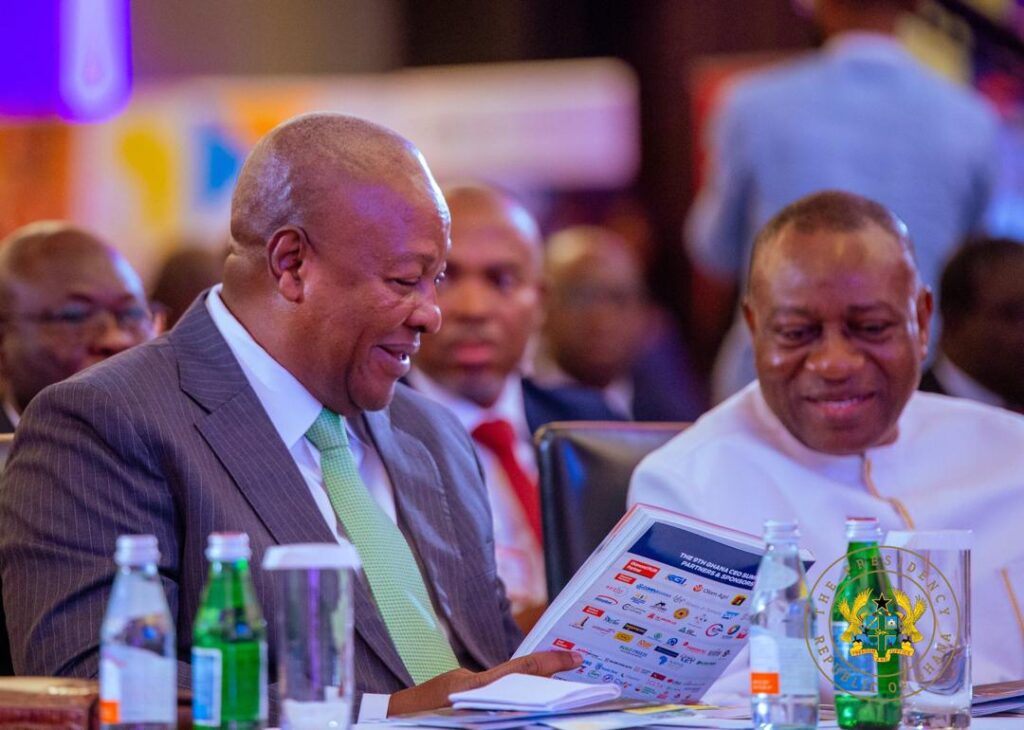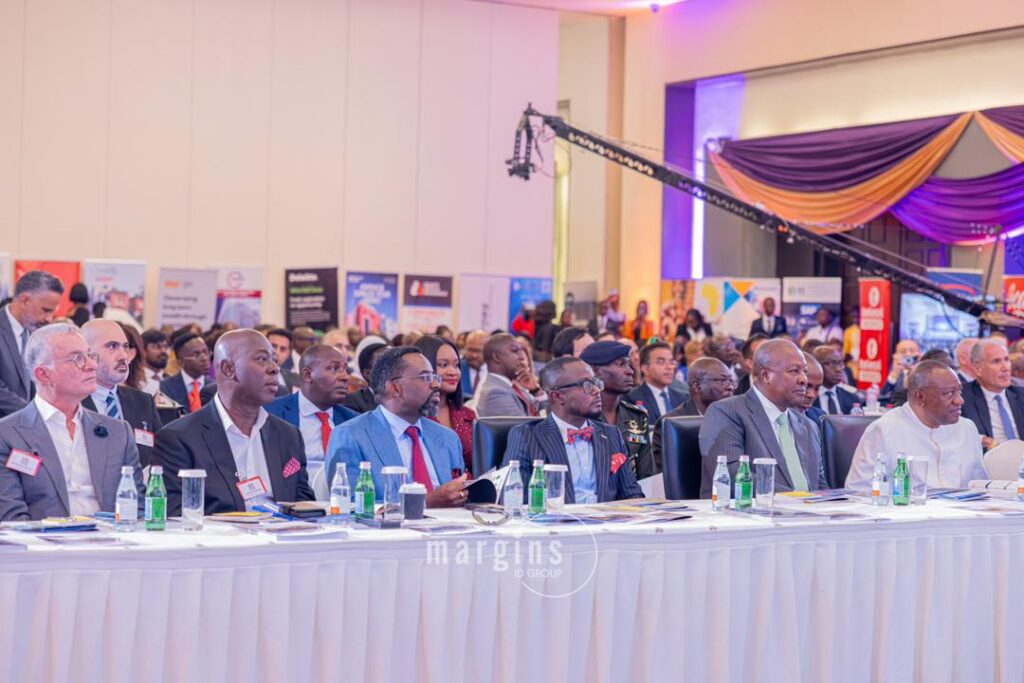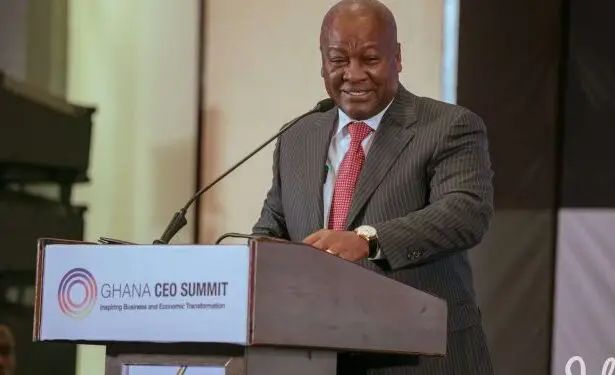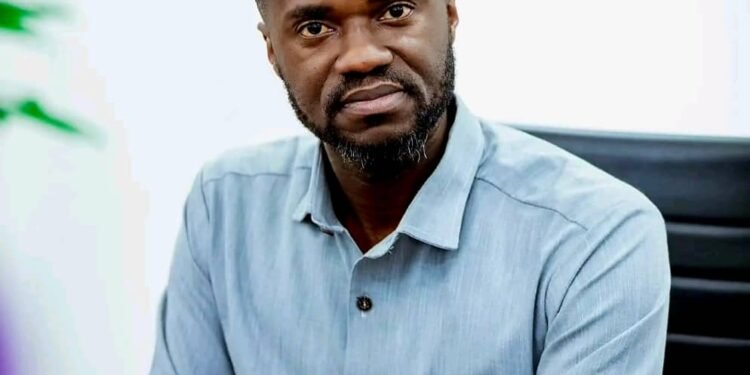President John Dramani Mahama has laid out an ambitious roadmap to reposition Ghana’s economy, vowing to reset the nation’s development trajectory through transparency, discipline, and a renewed compact with the private sector.
Speaking at the 9th Ghana CEO Summit in Accra, the President delivered a forward-looking yet sobering address, which both acknowledged past policy failures and outlined concrete steps toward a resilient, inclusive, and futuristic economy.
“This year’s theme: Leading Ghana’s economic reset, transforming business and governance for a sustainable, futuristic economy, could not have been more appropriate. It challenges us to examine where we have come from, acknowledge where we have faulted, and above all, define where we must go as a nation.”
HE President John Dramani Mahama
His address was at once a reflection on past successes and failures, and a declaration of intent to rebuild trust, reinvigorate industry, and foster sustainable national development.
President Mahama began by reminding attendees, comprising top business leaders, policymakers, and economists, of the solid financial architecture the previous NDC administration had built between 2013 and 2016.
He lauded the achievements under Finance Ministers Dr. Kwabena Duffuor and Mr. Seth Terkper, crediting them with spearheading reforms that deepened domestic and international financial markets.
Key innovations under his administration included the introduction of medium to long-term domestic bonds listed on the Ghana Stock Exchange, the operationalisation of the Central Securities Depository, and the launch of Ghana’s first US dollar-denominated domestic bond, which he proudly noted was oversubscribed.
Simultaneously, President Mahama noted that eurobonds were issued in a measured and strategic manner, with a sinking fund mechanism—fed by oil revenues—used to pay off maturing debts without fanfare or fiscal strain.

President Mahama disclosed that from 2013 to 2016, Ghana issued €4 bonds, all without default and these were anchored in a sinking fund mechanism designed to ensure repayment.
According to him, his first administration applied over GHS 335,000,000 from Ghana’s oil-funded sinking fund to settle maturing euro bond liabilities.
“We refinanced the $200,000,000 HIPIC era bond through our 2015 World Bank guaranteed bond. And before we left office, we left sufficient reserves enabling the next administration that came after us to pay off the balance in 2017 of the 2007 bond without distress. Ladies and gentlemen, this was not magic. It was just discipline, and it was foresight.”
HE President John Dramani Mahama
Legacy Dismantled
However, he decried how this robust framework was abandoned between 2017 and 2022 by the previous NPP administration, leading to “skyrocketing” debt accumulation and the eventual default on both domestic and external obligations—a first in Ghana’s post-independence history.
The fallout, he said, was catastrophic: from the domestic debt exchange that eroded pensions and investor confidence, to Ghana’s downgrade to junk status, and the severe credit squeeze that crippled small and medium enterprises.
“This is not simply a matter of global shocks. Other countries with smaller resource bases manage their recoveries much better than us. In our case, poor fiscal management, opaque collateralization of statutory funds, and disregard for procurement and accountability rules were major contributory factors.
“The results are visible. A loss of access to capital markets, both domestic and foreign, the collapse of investor confidence, and a shrinking private sector unable to plan, invest, or expand.”
HE President John Dramani Mahama
Pillars of Recovery
Despite the grim assessment, President Mahama was unequivocal in his optimism for Ghana’s future, unveiling eight core pillars that will drive what he calls an “economic reset”. The first pillar is ensuring discipline through the IMF program.

Here, the President assured the business community that Ghana remains committed to meeting targets under the IMF’s Extended Credit Facility, aiming for a successful fourth review by June 2025 and an exit by 2026.
According to him, post-exit, Ghana will adopt the Policy Support Instrument framework to signify its return to non-borrowing discipline.
The second pillar according to President Mahama is reopening capital markets responsibly. President Mahama emphasized that access to domestic and international capital markets will be restored—but only for commercially viable, self-financing projects.
According to him, future borrowing will be linked to self-financing, commercially viable projects, particularly by MDAs, MMDAs, and SOEs, ensuring value for money and sustainable repayment.
On his administration plans to strengthening sovereign funds and municipal financing, he pledged constitutional and legislative amendments to make contributions to Ghana’s sinking and stabilization funds mandatory.
“We’ll amend the Public Financial Management Act and the constitution to make contributions to the sinking and stabilisation funds mandatory. It will not be optional. So, a certain percentage of funds must be committed to the sinking and stabilisation funds.”
HE President John Dramani Mahama
Additionally, President Mahama noted that MMDCEs will be empowered to issue municipal bonds backed by their common fund allocations, to finance local infrastructure like roads, schools, and water systems.
Touching on clearing contractors’ arrears, President Mahama assured of transparency, adding that the government is awaiting an Auditor General-led audit of government arrears and commitments.
Once completed, President Mahama promised to clear only verified arrears and to enforce commitment controls using the GIFMIS and IPSAS-based accounting systems. He also indicated that new projects will be prioritised based on need, funding availability, and alignment with national interest to avoid legacy arrears.
On reactivating Public Financial Management reforms, the President outlined a renewed commitment to stalled reforms such as the Treasury Single Account, real-time budget monitoring tools, and an integrated tax administration system, all aimed at curbing waste and corruption.
Agriculture, Trade and Infrastructure Drive
With his administration plans to revitalising exports and increasted value-added production, through a repositioned Ghana Exim Bank, President Mahama noted that his government will focus on boosting non-traditional exports, agro-processing, and light manufacturing.
“The Agriculture for Economic Transformation Agenda will also roll out massive investments in oil palm, cocoa, cashew, shea, and other high-value tree crops.
“With two of our major export commodities, gold and cocoa, enjoying a good run in international markets, we will build our reserves and buffers to create the resilience to withstand any future global shocks.”
HE President John Dramani Mahama
Positioning Ghana as a regional trade and investment hub, President Mahama noted that infrastructure upgrades in ports, digital services, education, and healthcare will be prioritised to connect Ghanaian businesses to regional and global trade under the African Continental Free Trade Area (AfCFTA).
Summing up with his administration drive towards innovative infrastructure development, President Mahama assured that a new wave of infrastructure investment will be launched using Public-Private Partnerships (PPPs) and innovative financing tools like the “Big Push.”
These, according to him, will target sectors such as energy, housing, water, and urban renewal without reliance on reckless borrowing.
A New Deal for the Private Sector
President Mahama strongly underscored that the private sector would be central to the envisioned economic reset. Rebuilding macroeconomic stability, he said, is not the end goal but the platform upon which private investment and business confidence must grow.
“And in that regard, we will ensure policy predictability to enable medium and long-term planning for you. Access to credit and capital markets will not crowd you out.
“We’ll borrow responsibly and restrain ourselves in government borrowing so that the rest of the credit is available for you to expand your businesses. Consultation with industry will occur before any major reforms are made. And finally, a fiscal environment that rewards value creation and not rent seeking.”.
HE President John Dramani Mahama
Importantly, he pledged to institutionalize a National Business Consultative Platform, which will bring the public and private sectors together twice yearly for policy feedback, reform monitoring, and joint priority setting.
According to him, consultation with industry will precede all major reforms, assuring the private sector of his government’s commitment to building consensus in decision making.

From Crisis to Opportunity
President Mahama reminded the audience that in 2008, Ghana attained lower-middle-income status through sound policy and institutional reforms.
Today, he believes that with the right reset, Ghana can move further to become an upper-middle-income country with a diversified economy and strong institutions.
He commended companies such as Oca Decor and associations like the GPRTU for responding to the recent appreciation of the cedi by lowering prices—a gesture he encouraged others to emulate as a way of easing the burden on ordinary Ghanaians.
In his closing remarks, President Mahama called for a renewed public-private sector partnership based on mutual accountability, shared risks, and shared rewards.
He challenged the nation’s business community to embrace the reset not just as a policy shift, but as a national mission.
“The time has come for us to lift the gloom, to restore confidence, and to build again. And as I said in my inauguration, Ghana is open for business again. Together, we can lead Ghana’s economic reset and lay the foundations for a more prosperous, inclusive, and secure future.”
HE President John Dramani Mahama
As Ghana stands at a critical juncture, President Mahama’s speech at the 9th CEO Summit signals both a reckoning with the past and a bold blueprint for the future—a future where discipline, innovation, and partnership will define the country’s path to shared prosperity.
READ ALSO: Fmr. GIIF Board Chair Granted GH₵10 M Bail in Controversial Sky Train Case























